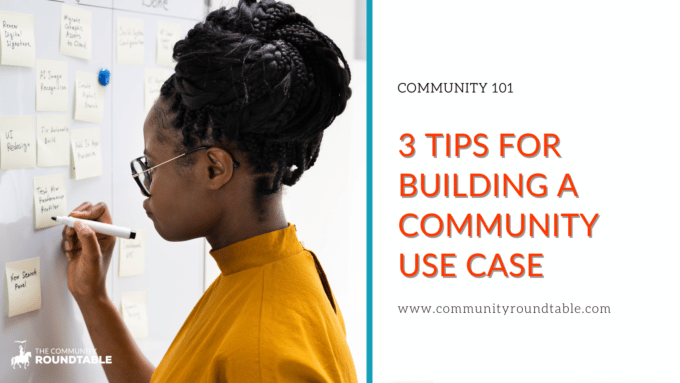The writing’s on the wall, your organization can benefit from a community. But how do you get leadership on board? You’re in luck, because we’ve got the scoop on successfully building a community use case!

Define your community’s goals
You know the old saying, “Don’t put the cart before the horse”? The same goes when building your use case. You can’t start dreaming up things like content strategy or gamification methods until you know what the objective of your community will be.
So, what need will a community solve for your potential members? For your organization at large? If you aren’t sure, you need to figure that out — stat. The best way to do that is by having conversations with your (future) audience.
Not the higher ups at the organization? No, not quite yet. If your members’ interests don’t align with your organizational ones then all of this work will be for nothing. No shared interest and your community will fail.
Nervous? No need! Chances are you already know who some of your potential community members will be (hint: they tend to be very active on your social posts, provide feedback after events, etc.). Talk with these future superusers. Listen to what they have to say, and find the way to make those needs align with the larger organizational ones. There’s absolutely no reason to reinvent the wheel.
Once you’re good on your community goals, it’s on to the next step!
‘Choose your [community] champion’
Community goals: check. Now, to find your executive sponsor/cheerleader. The easiest way to do that is through, you guessed it, more conversations!
By building and fostering relationships with potential executive sponsors, you’ll be able to better understand what they see as pain points for their areas. Knowing their pain can help ensure you address those issues — when possible — in the community, or plan to set clear expectations around the community and what it can and can’t accomplish.
Additionally, having these key folks in your back pocket can come in handy when it comes to your budgetary needs.
Speaking of budgets…
Establish a budget
Don’t have a panic attack, but the first budget you present might drop some jaws when the cost is shared. But it’s not a “just because” sort of situation. When you’re establishing a community, there are a lot of budgetary line items you need to take into consideration:
- Technology — Yes, some social media platforms (like Twitter, Reddit, and Facebook) have the ability to launch a community for free. While that might be tempting from a cost perspective, we would strongly encourage you to resist that temptation when possible. By purchasing third-party technology to host your community instead, you’ll be able to actually control it rather than being subject to another website’s rules.
- Staff — As mentioned in the 2022 State of Community Management, the community manager role has so many niche areas of focus now that it’s hard to contain within a singular person’s duties. No way to afford a staff? It’s OK. You have internal subject matter experts who can help. Use them.
- Design support — Most third-party tools have “out of the box” features you can use to launch your community. If you’re going for more of a branded look, you’ll need to account for design support in the budget.
- Marketing — You have to get the word out somehow. By budgeting for marketing support, you’ll be able to effectively promote the community to your audience where they already live.
Still sensing some hesitation based on your budget? Here’s your pièce de résistance: Community’s a long game. You won’t have a comprehensive look at results until your community 2+ years old! By reminding the powers that be of that fact, you’ll be able to more effectively make your argument — especially since you remembered to tie your community’s goals to your organization’s, right?
Present your case
You’ve done all the leg work, and now it’s time to make your case for a community. You might be nervous, but as long as you’ve fully fleshed out your use case it will be harder to turn down. Remember:
- Define your community goals, and be sure they relate to your organization’s goals.
- Find an executive champion (or sponsor), and get them on board.
- Build a realistic budget that plans for the first 2.5-3 years.
You’ve got this, we believe in you. Now go get that community, champ!
